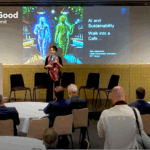
UNICRI’s programmes aim to promote national self-reliance and the development of institutional capabilities. To this end, UNICRI provides a one-stop facility offering high-level expertise in crime prevention and criminal justice problems. Technical co-operation is enhanced by the use of action-oriented research to assist in the formulation of improved policies and concrete intervention programmes. Institutional and on-the-job training of specialized personnel form an integral part of UNICRI activities.
Description of Activities on AI
Project 1: Responsible Artificial Intelligence Innovation in Law Enforcement
Through its specialized Centre for Artificial Intelligence and Robotics in The Hague, UNICRI advances understanding on the risks and benefits of AI, robotics and related technologies vis-à-vis crime, terrorism and other threats to security and seeks to support Member States to leverage the potential of these technologies in a responsible manner.
Fostering responsible AI innovation within the law enforcement community is one of the priority areas of the UNICRI’s Centre for Artificial Intelligence and Robotics. In this context, UNICRI has established a partnership with INTERPOL to create a unique global forum to discuss the advancements and impact of using AI for law enforcement. The purpose of this project is to demystify the world of AI, not only for law enforcement officers but also for policymakers, practitioners, industry partners, academic researchers, civil society and the general public.
Within this project, UNICRI and INTERPOL organize annual global meetings on AI for law enforcement, conducting in-depth interviews with several law enforcement experts and other partners and hosting virtual meetings with a multi-disciplinary group of experts to identify AI use cases for law enforcement and discuss issues related to the dichotomy between the potential opportunities and challenges presented by AI, coupled with the lack of guidance tailored to the relative novel use of AI in law enforcement.
During this process, UNICRI and INTERPOL have identified the need for developing operationally oriented support and guidance for law enforcement in the design, development and deployment of AI in a trustworthy, lawful and responsible manner and, in this regard, have undertaken the development of a “Toolkit for Responsible Artificial Intelligence Innovation in Law Enforcement”. The Toolkit, the development of which is funded by the European Commission DG HOME, is intended to provide guidance and support for law enforcement agencies on the development, procurement and deployment of AI in their work in a human rights compliant and ethical manner.
Through the Toolkit, law enforcement agencies globally will have access to the knowledge and resources needed to enable them to tap into the positive potential of AI. At the same time, many different stakeholders play an important role in promoting responsible AI in law enforcement. As a result, the resources developed as part of the Toolkit will also cater for and be approachable by other stakeholders, including industry, academia, civil society and the general public.
Project 2: Working with Law Enforcement to Build Capacities for the use of Artificial Intelligence to Combat Child Sexual Abuse and Exploitation Online
In 2019, UNICRI, through its Centre for AI and Robotics, together with the Ministry of Interior of the United Arab Emirates launched the AI for Safer Children initiative. This project aims to explore the positive potential of AI to support law enforcement agencies to prevent, detect and prosecute online child sexual abuse and exploitation.
Online child sexual exploitation and abuse has been growing exponentially over the last decades and has experienced a further increase throughout the COVID-19 pandemic. Law enforcement agencies face significant challenges in combating this crime, including a high turnover of investigators, largely due to the psychological burden of reviewing the abuse material, as well as the difficulties in identifying both perpetrators and victims and the challenges posed by the global nature of the Internet and new technologies such as encryption.
While AI tools already existing can contribute to solving these challenges, law enforcement agencies are not yet widely using them. Many are not aware of the potential of the AI tools or are sceptical towards the technology. Additionally, selecting and implementing AI tools is a complex process for which law enforcement agencies may lack the necessary knowledge and resources.
The project aims to tackle this issue through the development of a Global Hub consisting of a platform built to assist law enforcement in leveraging AI to combat online child sexual exploitation and abuse, combined with network-building, awareness-raising and advocacy on the issue.
Project 3: Building Knowledge on Counter-Terrorism in the Age of Artificial Intelligence / Human Rights Aspects Of The Use Of Artificial Intelligence In Counter-Terrorism
In 2020, UNICRI, through its Centre for Artificial Intelligence and Robotics commenced a research initiative aimed at exploring the dual nature potential of artificial intelligence (AI) from the perspective of counter-terrorism.
Together with the United Nations Counter-Terrorism Centre (UNCCT) of the United Nations Office of Counter-Terrorism (UNOCT), UNICRI explored the dual nature potential analyzing the concerning aspects of the advent of AI, such as the possibility of its use with malicious intent by terrorist groups and individuals, as well as how AI might be leveraged to support counter-terrorism efforts, in particular in terms of combatting terrorist use of the Internet and social media. This resulted in the release of two reports “Algorithms and Terrorism: The Malicious Use of Artificial Intelligence for Terrorist Purposes” and “Countering terrorism online with artificial intelligence – An Overview for Law Enforcement and Counter-Terrorism Agencies in South and South-East Asia”.
In partnership with UNOCT/UNCCT and the Office of the High Commissioner for Human Rights (OHCHR), UNICRI further examined artificial intelligence technology can be used to counter terrorism in a manner that complies with human rights. The ongoing research will result in the release of report on the human rights aspects of the use of AI in counter-terrorism in late 2021.
UNICRI, UNOCT/UNCCT and OHCHR organized a high-level briefing entitled “Counter-Terrorism in the Age of Artificial Intelligence: Risks, Opportunities and Safeguarding Human Rights” on 29 June 2021 as part of the Second Counter-Terrorism Week at the United Nations. During this briefing the findings of their collective research were presented.
Project 4: Responsible Limits on Facial Recognition Technology
The development of facial recognition technology (FRT) presents considerable opportunities for socially beneficial uses, mostly through enhanced authentication and identification processes, but it also creates unique challenges. To fully grasp these challenges and the trade-offs they may entail and to build appropriate governance processes, it is necessary to approach FRT deployment through specific use cases.
To this end, the World Economic Forum, in partnership with UNICRI, INTERPOL and the Netherlands Police, has spearheaded a global and multistakeholder policy initiative to design a robust governance framework for the responsible use of FRT for law enforcement investigations
This workstream was started in November 2020 focused on the law enforcement use case – identifying a person by comparing a probe image to one or multiple reference databases to advance a police investigation. While law enforcement has been using biometric data, such as fingerprints or DNA, to conduct investigations, facial recognition technology represents a new opportunity for law enforcement but also a new challenge.
The ambition of this work is to support law- and policy-makers across the globe to design an actionable governance framework that addresses key policy considerations in terms of the prevention of untargeted surveillance, the necessity of a specific purpose, the performance assessment of authorized solutions, the procurement processes for law enforcement agencies, the training of professional forensic examiners, and the maintenance of the chain of command for emergency situations. To achieve this goal, this multistakeholder community has co-designed a set of principles for action that defines what constitutes the responsible use of facial recognition for law enforcement investigations and a self-assessment questionnaire that details the requirements that law enforcement agencies must respect to ensure compliance with the principles for action.








